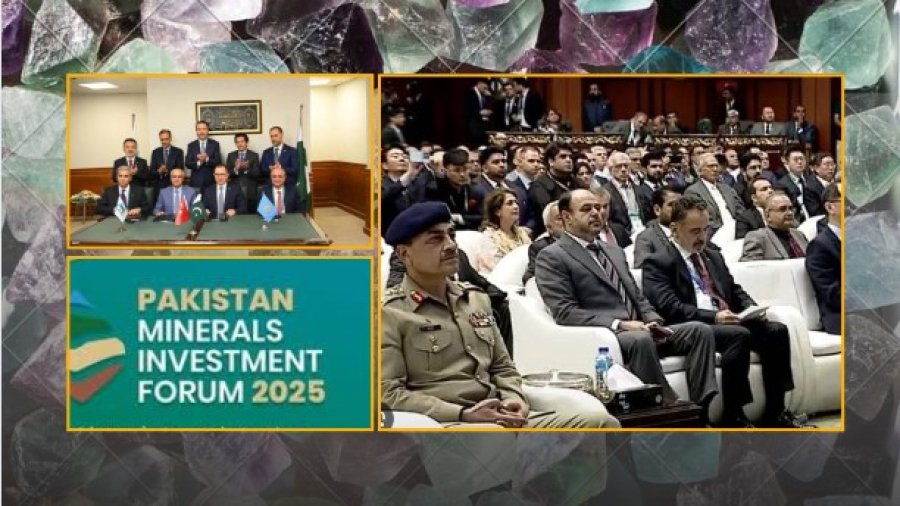The Minerals Investment Conference held in Islamabad under the federal government and SIFC yielded encouraging outcomes. Dozens of Memorandums of Understanding (MoUs) were signed by foreign companies, with Prime Minister Shehbaz Sharif expressing the intent to convert these MoUs into formal agreements. The organization of this conference is a welcome step.
Pakistan’s Economic Crisis and Its Underlying Causes
It is undeniable that Pakistan has been grappling with an economic crisis for several years. For developing countries like ours, there is often no choice but to turn to international financial institutions when economic pressures mount. It is beyond dispute that the previous government under Imran Khan, due to poor decisions and inefficiency, brought the country to the brink of default. However, the PDM government averted this crisis by accepting the IMF’s tough conditions.
When there is an imbalance between income and external payments, the only viable options for countries like Pakistan are to increase industrial and agricultural production, along with exports. Only then can we overcome the economic crisis and avoid the harsh terms set by financial institutions. But such recovery is impossible without a revolutionary transformation in the agriculture and industrial sectors.
Challenges in the Agricultural Sector
Agriculture in Pakistan continues to rely on outdated and obsolete methods. Efforts by farmers and successive governments to bring innovation in this sector have proven insufficient. Our agricultural sector not only clings to antiquated cultivation techniques but also suffers from herd mentality when it comes to crop selection based on seasonal price fluctuations.
For instance, if the price of wheat rises in a given year, all farmers rush to grow wheat the following season, causing the price to crash and resulting in financial losses for both farmers and those involved in grain trading. Similarly, if a particular commodity is priced at one hundred rupees per kilo in one season, excessive production the following year can drop its price to just ten rupees per kilo.
Weaknesses in the Industrial Sector
Our industrial sector is not in a position to contribute significantly to foreign exchange reserves through exports. However, the country is rich in mineral resources, which offers hope. With strategic attention and planning, this sector could help pull the country out of its economic turmoil.
Political Controversies Following the Conference
Since the Minerals Investment Conference and the subsequent directives to provincial governments for legislation, some political elements have turned the issue into a point of contention. Political rhetoric around this sensitive subject has escalated.
The controversy began with a statement by Imran Khan’s sister, Aleema Khan, advising provincial authorities to delay the Minerals Bill until Imran Khan is released. Subsequently, while the provincial government praised the bill enthusiastically, PTI leaders voiced starkly different opinions. ANP Chief Aimal Wali Khan also seized the opportunity to politicize the matter, claiming that minerals have become a provincial subject after the 18th Amendment, thereby eliminating federal jurisdiction.
Provincial Capacity and Wastage of Mineral Resources
Following the 18th Amendment, provinces have gained autonomy over many matters, including minerals. However, they lack the capacity to manage these departments effectively. The mineral contracts awarded to local individuals or companies are executed using outdated and conventional mining methods. As a result, significant quantities of minerals are wasted, and the provinces receive minimal benefit.
For example, if a person or company extracts marble worth one crore rupees, the government barely earns a few lakhs. The outdated mining methods not only lead to the reckless wastage of raw materials but also cause severe environmental harm.
The Need for Foreign Investment and Innovation
Bringing in foreign investment and companies to this sector could reduce resource wastage and introduce much-needed innovation. Foreign companies practice environment-friendly and modern mining techniques. They possess advanced machinery, trained personnel, and comprehensive expertise in the tasks they undertake.
By contrast, our domestic industries suffer from herd mentality and lack skilled labor, capital, and machinery. As a result, in the past seventy-eight years, we have failed to harness the true potential of our natural and mineral resources—resources that could have helped us overcome the economic crisis and increased national wealth.
In essence, despite being blessed with abundant resources, we have not been able to utilize them effectively to escape the clutches of debt and achieve self-reliance.
Government Initiatives and Hopes for the Future
The current government has taken several steps to modernize the agriculture and industrial sectors, including encouraging foreign investors. Now, focus is also shifting toward mineral resources. As mentioned earlier, mining and exploration in Pakistan still rely on outdated methods, leading to the loss of valuable resources.
In this context, the efforts of the current government and SIFC are commendable. The arrival of foreign companies, capital, and expertise in the sector promises exponential growth. With the right approach, we can emerge from financial and economic turmoil.
Need for Political Consensus in National Interest
Political forces must acknowledge their responsibilities and refrain from politicizing such a vital issue. The government should engage all political stakeholders in constructive dialogue—especially those attempting to exploit this sensitive matter for political gain while misrepresenting the actual purpose of the Minerals Investment Conference.
Despite sitting atop untapped wealth, we are still compelled to accept the humiliating conditions of financial institutions. Political leadership must show maturity and foresight, prioritizing national interests over party politics in matters related to our mineral wealth.



